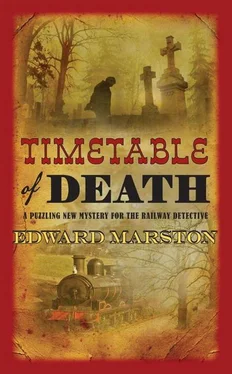Edward Marston - Timetable of Death
Здесь есть возможность читать онлайн «Edward Marston - Timetable of Death» весь текст электронной книги совершенно бесплатно (целиком полную версию без сокращений). В некоторых случаях можно слушать аудио, скачать через торрент в формате fb2 и присутствует краткое содержание. Год выпуска: 2015, ISBN: 2015, Издательство: ALLISON & BUSBY, Жанр: Исторический детектив, на английском языке. Описание произведения, (предисловие) а так же отзывы посетителей доступны на портале библиотеки ЛибКат.
- Название:Timetable of Death
- Автор:
- Издательство:ALLISON & BUSBY
- Жанр:
- Год:2015
- ISBN:9780749018122
- Рейтинг книги:4 / 5. Голосов: 1
-
Избранное:Добавить в избранное
- Отзывы:
-
Ваша оценка:
- 80
- 1
- 2
- 3
- 4
- 5
Timetable of Death: краткое содержание, описание и аннотация
Предлагаем к чтению аннотацию, описание, краткое содержание или предисловие (зависит от того, что написал сам автор книги «Timetable of Death»). Если вы не нашли необходимую информацию о книге — напишите в комментариях, мы постараемся отыскать её.
Timetable of Death — читать онлайн бесплатно полную книгу (весь текст) целиком
Ниже представлен текст книги, разбитый по страницам. Система сохранения места последней прочитанной страницы, позволяет с удобством читать онлайн бесплатно книгу «Timetable of Death», без необходимости каждый раз заново искать на чём Вы остановились. Поставьте закладку, и сможете в любой момент перейти на страницу, на которой закончили чтение.
Интервал:
Закладка:
The fact that it was a dull day with a promise of rain only added to his feeling of dread. He’d known and been very fond of Cicely Peet but it was not her tragic death that filled his mind. What preoccupied him was the image of a murder victim in the grave prepared for her. Fearful that something untoward might have occurred in her new resting place, he bestowed a token kiss on his wife’s forehead then let himself out of the vicarage. When he walked around the church to the site of the fresh plot, he saw movement behind a neighbouring headstone and his heart constricted. The figure of a man rose up as if part of some weird ritual of resurrection. The vicar was now trembling all over. It was only when the initial shock wore off that he realised he was looking at Bert Knowles.
‘I slept the night ’ere,’ explained the gravedigger, stretching himself. ‘Nobody was goin’ to jump into this ’ole I dug. I made sure o’ that, Vicar.’ He bared his teeth in a hopeful grin. ‘Is there any charnce o’ some o’ that theer sherry o’ yours to wake me up proper?’
Victor Leeming was no stranger to funerals. There’d been a worrying sequence of them in his own family and he’d watched his grandparents, parents, two brothers and a sister laid to rest over the years, increasing his sense of being a lone survivor. In the course of his work, too, he’d been obliged to attend a number of funerals. Some were of police colleagues, killed in the execution of their duties, and others — as in the latest case — were of murder victims.
When he walked towards St Mary’s church, a steady drizzle was falling. He’d heard enough about Cicely Peet during his earlier visit to Spondon to be aware of her exalted position in the community. Even so, he was taken aback by the number and quality of vehicles stretching down Church Hill and beyond. No women attended but a sizeable male congregation had come to pay its respects to the deceased. Leeming was glad. It was easier to remain anonymous in a crowd. When he joined the queue of solemn men filing into the church, he picked up several comments about Cicely Peet. She was not only held in high regard by everyone. Her beauty was also recalled and praised. What saddened the mourners was that such a lovely woman should have died so suddenly instead of gracing the village for many years to come. The general feeling was that her husband, devastated by his loss, would not be long in following her to the grave.
The mourners were not confined to members of the gentry who could afford expensive carriages and retain coachmen to drive them. Villagers were also there in force. Leeming heard local traders talking about the pleasure they always had from serving such a delightful lady. A hefty man with a full beard and a gravelly voice talked about her generosity whenever he’d shoed her horse. Leeming suspected that he might be the blacksmith whose daughter had actually found the interloper in the earlier grave and that the man had felt impelled to attend the funeral as a result. The sergeant’s supposition was confirmed when he overheard someone asking the blacksmith if his children had recovered yet from their grim discovery.
‘Lizzie hasn’t slept a wink since,’ replied Walter Grindle.
‘What abaht thy lad?’
‘Sam’s all of a shek.’
‘Who could’ve done sich a thing?’
It was a question that Leeming was there to answer if enough evidence presented itself but there was no sign of it so far. He made a point of sitting in the back row in the nave with his ears pricked to gather the muttered remarks of those nearby. When the coffin was brought in by the bearers with due solemnity, there was an audible sigh of grief. Leeming made no contribution to it. Nor did he hear much of the burial service. He was there to look and listen rather than to be caught up in the emotion of the occasion. What he did notice was that the vicar seemed extremely nervous for someone who must have presided over a large number of funerals in the course of his ministry. The Reverend Michael Sadler was slow and hesitant. In his eulogy of Cicely Peet, he spoke with great care as if fearing that he might offend her family by a misplaced word or a jarring sentiment. Leeming felt sorry for him. The vicar was clearly going through an ordeal.
In a gathering of lowered heads and sorrowful expressions, it was difficult to pick out anyone who might be a potential suspect. As time went on, however, one person did arouse Leeming’s curiosity. He was a young man with pleasant features and a flitting gaze. Since he sat on the end seat in the back row, he was only a matter of yards away from Leeming who could see him across the aisle. Like the detective, he was taking less interest in the service than in those attending it. No grief registered in his face or behaviour. He kept glancing around at those near him. When the service came to an end, the long procession to the churchyard began and Leeming had the opportunity of taking a closer look at the young man. There was something odd about him that made him stand out but the sergeant couldn’t decide what it was.
Eventually, it was time for the back rows on both sides of the nave to disgorge their occupants. Leeming tried to get close to the young man but there were too many people in the way. Over the heads of mourners, he could see him talking to a number of people in turn but he didn’t get the feeling that he was a local man. He seemed to be as much a stranger as Leeming himself. As the congregation gathered around the grave, Bert Knowles lurked nearby with his spade, seemingly unaffected by the gravity of the event and simply waiting for his moment. Leeming never got near enough to see anything of the committal or to watch the drizzle adding a slippery coating to the coffin. His eyes remained on the young man, who now seemed more and more detached from what was going on. All of a sudden, he turned on his heel and headed towards the gate as if he’d got what he wanted and was anxious to sneak away. Leeming went after him.
The young man was walking briskly in the direction of the railway station. It required a sustained effort for Leeming to catch him up. Placing a firm hand on the man’s shoulder, he brought him to a halt and spun him around.
‘Excuse me, sir,’ said Leeming, politely. ‘I’d like a word with you.’
CHAPTER FIVE
After having breakfast with Leeming at the Royal Hotel, Colbeck had set off to make his own enquiries. He’d already found out from the hotel management that nobody could remember who had delivered the letter for him. Apparently, it had just been slapped down on the reception desk by someone who left immediately. How much notice he should take of the name he’d been given, Colbeck didn’t know but he was certain that Gerard Burns had not been plucked at random out of the air. The man definitely existed and needed to be found.
Colbeck was waiting on the platform at Derby railway station when a possible source of information materialised beside him. It was almost as if Superintendent Wigg had followed him there.
‘Might I ask where you’re going, Inspector?’ he said.
‘I’m going where I need to go,’ replied Colbeck, levelly.
‘My men are, of course, ready to offer help whenever you need it.’
‘Thank you, Superintendent. I may well need to call on them at some stage.’
‘We await your summons.’
‘Is there any news about the post-mortem?’
‘It’s not yet been completed. My understanding is that … well, it is proving more difficult than at first assumed. When they’re available, I’ll make sure that you have full details.’
‘I’d value that information.’
‘We understand the significance of a post-mortem, Inspector,’ said Wigg, pointedly, ‘so please don’t treat us like country cousins. We’re a young force but no less effective for that. When the Derbyshire Constabulary was established two years ago, we had eight divisions with Belper Police Station as its Divisional Headquarters. That arrangement proved unsatisfactory so it was moved this year to Derby instead and I was put in charge of it.’
Читать дальшеИнтервал:
Закладка:
Похожие книги на «Timetable of Death»
Представляем Вашему вниманию похожие книги на «Timetable of Death» списком для выбора. Мы отобрали схожую по названию и смыслу литературу в надежде предоставить читателям больше вариантов отыскать новые, интересные, ещё непрочитанные произведения.
Обсуждение, отзывы о книге «Timetable of Death» и просто собственные мнения читателей. Оставьте ваши комментарии, напишите, что Вы думаете о произведении, его смысле или главных героях. Укажите что конкретно понравилось, а что нет, и почему Вы так считаете.












